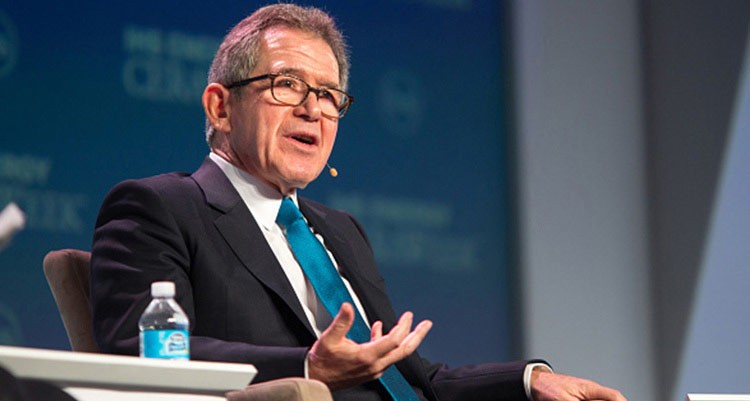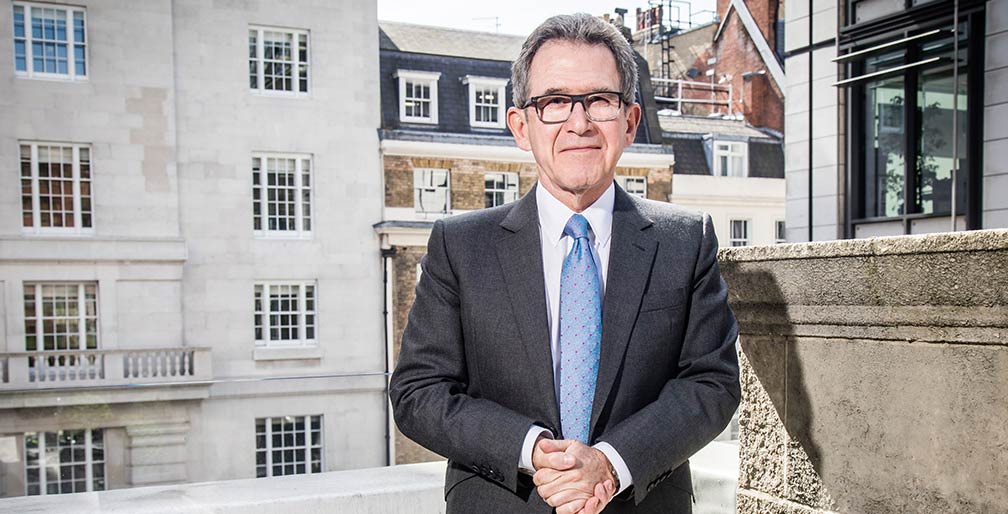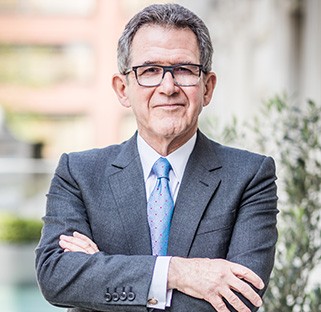In the face of disruption, CEOs must be willing to take a stand.
As CEO of BP, Lord John Browne did just that. When the debate surrounding climate change escalated in 1997, Lord Browne became the first oil company chief to acknowledge the effect climate change could have on the industry and the environment. Despite criticism from his colleagues, he changed BP’s tagline from “British Petroleum” to “Beyond Petroleum,” committed to reducing the company’s carbon emissions and began researching alternative sources of energy.
“Lord Browne has always been controversial,” says Bill Broussard, a consultant with Insigniam. “Since working with him in the 1990s, Lord Browne has remained one of my favorite leadership icons. In part because he grew and transformed one of the world’s giant energy companies but mostly because he’s a futurist, unconventional traditionalist, social anthropologist and philosopher at heart.”
Today, nearly a decade since Lord Browne left BP, climate change is more than a potential disruptor; its effects have arrived. Major organizations around the world are trying to make their footprint more environmentally friendly. And while Lord Browne still advocates for holdouts to get on board—in a recent article for The Financial Times, he declared, “If society is saying it is time to change our energy mix, I do think the big players should be involved in the change”—he also now looks to educate business leaders about the importance of embracing disruptors stemming from social change. In his latest book, Connect: How Companies Succeed by Engaging Radically with Society, Lord Browne argues, “Businesses sometimes think they control the world. They don’t. They are controlled by the world. Business is there as a servant.”
IQ interviewed Lord Browne—who last year became executive chairman of L1 Energy, the $10 billion oil and gas investment arm of LetterOne Holdings—to uncover his thinking about disruption and his advice to business leaders on how to be more aggressive in the pursuit of change.
IQ: You talk in Connect about the importance of engaging with society to build a sustainable business strategy. Why is that important?
Lord John Browne: When I was at the Stanford Graduate School of Business, I made the observation that while business is one of the most important motors of human progress, societies have consistently demonstrated dislike of many parts of business. They don’t like businesspeople because they appear to be doing things simply for their own self-benefit, not for the benefit of anybody else.
We’ve seen it again and again over the course of history, and it continues today. I have been a great advocate for the highly responsible use of hydrocarbons in the light of risks of climate change since the mid-’90s, but there are still a lot of people who say, “It doesn’t matter what happens. We just have to stop using hydrocarbons.” That sort of debate isn’t useful because the fact is that we do need to use hydrocarbons for quite a long time, but we need to use them more efficiently and in different ways. Getting that understanding without someone saying, “Well, they would say that, wouldn’t they, because that’s the way they make a lot of money and put it in their pockets,” therein lies the issue.
“Businesses sometimes think they control the world. They don’t. They are controlled by the world. Business is there as a servant.”
IQ: How can executives overcome this type of distrust?
JB: There is a very strong corporate sense that problems should be repelled rather than leaned into. I think, to use Sheryl Sandberg’s phrase, leaning into all problems is the way to go. This requires you to actually engage with your stakeholders, with different bits of society, and actually engage rather rapidly.
Everyone knows that everything anybody does is inspected by millions of people who communicate with each other. Yet companies tend to think that they can create their own world. They can’t. They have to really lean into the problem and do the right thing and do it in a very independent way.
In Connect, we share an example of BP’s radical engagement in Tangguh, Indonesia, a country that was abused by so many people. There were terrible human rights problems, tribes were at war, and people had overfished the bay and cut down some of the rain forest for palm oil. Then here comes BP, a company with the right intention, who bought a gigantic gas field that was inconveniently located under a couple of villages.
Initially, the engineers said, “It’s obvious. We need to move the villages.” It made sense from an engineering standpoint, but it was a bizarre idea when you think about the context of operating in a community where nobody trusted anybody. Instead, we worked around the villages, which was more difficult but better for the community. We also gave preference for employment to local people, and set up employment centers away from the villages to prevent carpetbaggers from coming in.
It was a wonderful plan, but no one believed it. So we set up an independently financed monitoring commission, led by former U.S. Sen. George Mitchell, to monitor what BP was doing. A critical rule for the monitoring program was that he would write reports that would not be reviewed by BP before they were published. That was the radical bit. Internally, of course, this did not go down that well, and externally it didn’t change things overnight. But soon people figured out that the commission was actually independent, and it made everything possible.
IQ: Why do many companies struggle to anticipate disruptive threats?
JB: In the end, to deal with disruption you have to do just a few things. First, you’ve obviously got to be acutely aware of your context. You can’t exist in a bubble. So many companies—and I’ve been there and done it—get caught up in the stuff going on internally that they live in a bubble. Sometimes you’re surrounded by people who live in a bubble.
An understanding of the wide context is so crucial. It is very uncomfortable to think about as well because you actually have to think about existential threat. That’s not easy for people to discuss. That’s a very big thing.
Secondly, you really have to keep reminding yourself of purpose in life. Purpose is not fully satisfied by simply thinking of shareholder returns. Shareholder returns are an outcome, a very important outcome, but the purpose has to be higher than that. Otherwise you will probably suboptimize and not produce the right shareholder return.
IQ: How do executives need to change their way of thinking when approaching disruption?
JB: In business it’s easy to say, “Look. We’ve invented something that’s great. It’s good for you. Have it.” It needs to be the other way around. We have to say to people, “What do you want? How can we help you? You’re part of this society we’re serving. How do we get on with you?” That’s about engagement, I think.
The same is true with the big debate on climate change, which is still raging with the big oil and gas companies. I do think that resisting, which is what most of the oil and gas companies are doing, is actually futile in this area. Engagement with society to look for a real solution together has to be the way to go. Share on X
IQ: How can companies identify the social disruptors they should focus on?
“Shareholder returns are an outcome, a very important outcome, but the purpose has to be higher than that.”
JB: First every company has a specific skill or skills. They’ve got to think about the pieces that are good for them today and for tomorrow. In the case of Pepsi and Coke, for instance, they have to worry about obesity; Anheuser-Busch has to worry about alcoholism. I think oil companies and utilities have to worry about climate change. There are a whole variety of these big social issues that neatly fall into the purview of a company.
The second consideration is the impact of the changes in technology and consumer behavior, whether that is how people live in cities or what can be done by machine-aided activity that would otherwise have been done by people. That’s unstoppable. In my whole business career going back to the’60s, that’s been an impact. It just gets faster and faster and faster. We have to think through, “Where does the disruption take us, and what do we want to do? What are we building today to meet that need? Can we maintain flexibility?” Flexibility costs money, but it actually costs less than totally restructuring after you build something that is wrong for the future.
In the case of oil and gas, for example, I think people do have to think about the following: If we are to burn oil and gas, we need to do something to limit the amount of carbon dioxide that goes into the atmosphere. Can we capture it? Can we use it? Can we store it? It’s the same with methane, natural gas. You can’t let natural gas go into the atmosphere. It’s much more damaging in terms of impact on climate change than CO2. You’ve got to keep it tightly stored even in transportation. Do we have the right technology? Do we have the right monitoring?
Third, what else do we do with all these [disruptors and skills]? What other business should we be in? For example, if you’re in oil and gas, should you create a business strategy to produce electricity from renewables?
Finally, specifically for oil and gas, you really have to think very carefully about how to attract great people into an industry that many young people view as substandard. That, I think, is a very important challenge. Young people want to go to startups. They want to go to a bunch of other places in Silicon Valley or Silicon Roundabout in London and create a startup, create an app, do something different for the future.
IQ: Can you give an example of a company that handles disruption well?
JB: The very best example in my personal experience was Intel. I had the great privilege of serving on the board of Intel Corp. under the chairmanship of Gordon Moore when Andy Grove was the CEO. That company moved from memory into microprocessors when leadership saw a disruption coming, and it got there before anybody else. It was absolutely amazing. It is one of the great examples of realizing what was happening in the marketplace and creating the disruption for the future.
IQ: Are there any companies that you think are great examples of doing it wrong?
JB: No, I’ve never met anybody who does it totally wrong. The major disruptions at the moment are based in both the sharing economy and the virtual economy. Those disruptors are reaping both the reward and the consequences of it. The reward is growth; people want to have that flexibility. The consequences are a great rumbling of the regulators, like we’ve seen with Uber (see “When a Disruptor Meets Regulators,” below).
It’s important for the companies to tend to all these things because you never know. If you bury a volcano, it may just blow up one day. So while these organizations are certainly disrupting and doing it pretty well, there’s a lot of unattended business. Of course, as they’re disrupting, every disruptor creates an opportunity to be disrupted themselves.
 IQ: What advice do you have for CEOs about identifying and dealing with
IQ: What advice do you have for CEOs about identifying and dealing with
disruptions that are on the horizon?
JB: I would say that the most important thing is to recognize that every single industry is disrupted at one time in its life. The best thing is to surround yourself with people who don’t think like you, and get out of the bubble that inevitably is created around you.







